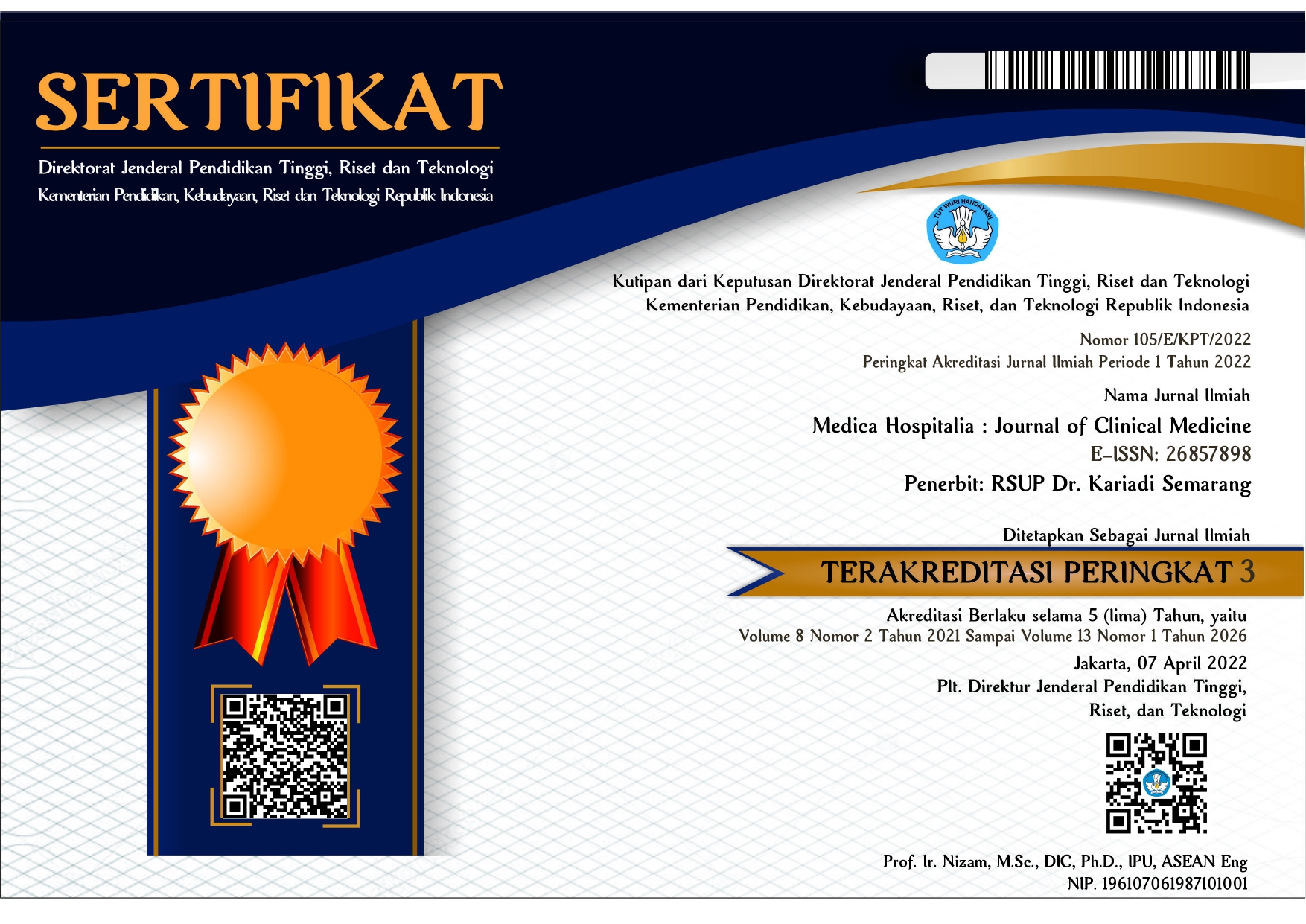Correlation Between Visceral Fat And Lipid Profile in Myocardial Infarction Patients
DOI:
https://doi.org/10.36408/mhjcm.v10i2.797Keywords:
myocardial infarction, body composition, visceral fat, lipid profileAbstract
BACKGROUND : Previous studies reported that visceral fat plays an important role in cardiovascular disease, even in non-obese individuals. Bioelectrical impedance analysis (BIA) is a non-invasive and radiation-free method for assessing visceral fat. Not much is known whether visceral fat correlates with lipid profile in myocardial infarction (MI) patients in Indonesian population.
PURPOSE : To analyze the correlation between visceral fat and serum lipid profile in MI patients.
METHODE : This is a correlational study on 32 MI patients hospitalized at the ICCU of RSUP Dr. Kariadi Hospital recruited with consecutive sampling. Visceral fat was measured by BIA SECA mBCA 525 series, data regarding levels of total cholesterol, triglycerides, low density lipoprotein (LDL), and high density lipoprotein (HDL) were gathered from medical record. The data were normally distributed, then the hypothesis was tested with the Pearson.
RESULT : The mean age of the subjects was 55 ± 9.88 years, with 87.5% being male. As many as 81.3% of subjects experienced ST-elevation myocardial infarction (STEMI). The average body mass index (BMI) was 26.2 ± 3.68 kg/m², in which 40.6% of subjects were classified as grade 1 obesity. The majority of subjects (93.8%) had high visceral fat. As many as 68.8% of subjects had high LDL levels with an average of 120.5 ± 38.84 mg/dL. HDL average was 35±13.55 mg/dL with 62.5% of subjects having low HDL levels. More than half of the subjects (56.3%) experienced hypertriglyceridemia with an average of 157.4 ± 55.84 mg/dL. Visceral fat was significantly related to total cholesterol and triglycerides (r=0.40; p=0.02 and r=0.36; p=0.04).
CONCLUSION : There is a significant correlation between visceral fat and total cholesterol and triglycerides in MI patients.
Downloads
References
1. Martín-Castellanos Á. The body composition in myocardial infarction males. Novel findings in both the association and. J Negat NO Posit RESULTS. 2017 Sep 1;(9):388–98.
2. Obesity and Cardiovascular Disease: A Scientific Statement From the American Heart Association [Internet]. [cited 2022 Jun 5]. Available from: https://www.ahajournals.org/doi/epub/10.1161/CIR.0000000000000973
3. Dehghan M, Merchant AT. Is bioelectrical impedance accurate for use in large epidemiological studies? Nutr J. 2008 Sep 9;7:26.
4. Martín-Castellanos Á. The body composition in myocardial infarction males. Novel findings in both the association and. J Negat NO Posit RESULTS [Internet]. 2017 Sep 1 [cited 2021 Mar 21];(9):388–98. Available from: https://doi.org/10.19230/jonnpr.1547
5. Powell-Wiley TM, Poirier P, Burke LE, Després JP, Gordon-Larsen P, Lavie CJ, et al. Obesity and Cardiovascular Disease: A Scientific Statement From the American Heart Association. Circulation [Internet]. 2021 May 25 [cited 2022 Feb 8];143(21). Available from: https://www.ahajournals.org/doi/10.1161/CIR.0000000000000973
6. Dehghan M, Merchant AT. Is bioelectrical impedance accurate for use in large epidemiological studies? Nutr J [Internet]. 2008 Dec [cited 2021 Mar 9];7(1):26. Available from: http://nutritionj.biomedcentral.com/articles/10.1186/1475-2891-7-26
7. Sumarni S. The correlation between visceral fat levels and lipid profile in obese adults. Med Tadulako J Ilm Kedokt Fak Kedokt Dan Ilmu Kesehat. 2017 Dec 18;4(1):16–25.
8. Laporan-Riskesdas-2018-Nasional.pdf [Internet]. [cited 2022 Jun 22]. Available from: https://dinkes.kalbarprov.go.id/wp-content/uploads/2019/03/Laporan-Riskesdas-2018-Nasional.pdf
9. Aji IAK, Setiawan AA, Pramudo SG. The impact of body mass index to acute myocardial infarction in-hospital patients mortality rate in dr. Kariadi hospital. 2020;9:10.
10. Chadwick Jayaraj J, Davatyan K, Subramanian SS, Priya J. Epidemiology of Myocardial Infarction. In: Pamukçu B, editor. Myocardial Infarction [Internet]. IntechOpen; 2019 [cited 2022 Jun 22]. Available from: https://www.intechopen.com/books/myocardial-infarction/epidemiology-of-myocardial-infarction
11. Williams R, Periasamy M. Genetic and Environmental Factors Contributing to Visceral Adiposity in Asian Populations. Endocrinol Metab. 2020 Dec;35(4):681–95.
12. Hudzik B, Nowak J, Szkodziński J, Zubelewicz-Szkodzińska B. Visceral Adiposity in Relation to Body Adiposity and Nutritional Status in Elderly Patients with Stable Coronary Artery Disease. Nutrients. 2021 Jul;13(7):2351.
13. Jang Y, Kim OY, Ryu HJ, Kim JY, Song SH, Ordovas JM, et al. Visceral fat accumulation determines postprandial lipemic response, lipid peroxidation, DNA damage, and endothelial dysfunction in nonobese Korean men. J Lipid Res. 2003 Dec 1;44(12):2356–64.
14. von Krüchten R, Lorbeer R, Müller-Peltzer K, Rospleszcz S, Storz C, Askani E, et al. Association between Adipose Tissue Depots and Dyslipidemia: The KORA-MRI Population-Based Study. Nutrients. 2022 Feb 14;14(4):797.
15. Tang L, Zhang F, Tong N. The association of visceral adipose tissue and subcutaneous adipose tissue with metabolic risk factors in a large population of Chinese adults. Clin Endocrinol (Oxf). 2016;85(1):46–53.
16. Arpón A, Milagro FI, Santos JL, García-Granero M, Riezu-Boj JI, Martínez JA. Interaction Among Sex, Aging, and Epigenetic Processes Concerning Visceral Fat, Insulin Resistance, and Dyslipidaemia. Front Endocrinol [Internet]. 2019 [cited 2023 Jan 30];10. Available from: https://www.frontiersin.org/articles/10.3389/fendo.2019.00496
17. Correlation of body visceral fat rating with serum lipid profile and fasting blood sugar in obese adults using a noninvasive machine | Elsevier Enhanced Reader [Internet]. [cited 2023 Jan 30]. Available from: https://reader.elsevier.com/reader/sd/pii/S2405844021003698?token=80B9002E585F922F9ACD2C12A05DA36EEF6C4C870777680A7AC1F4DCE66C9C1855FCEB75B31BB1A9CB1F20FBF9BD3A97&originRegion=eu-west-1&originCreation=20230130041309
18. Walter M. Interrelationships Among HDL Metabolism, Aging, and Atherosclerosis. Arterioscler Thromb Vasc Biol. 2009 Sep;29(9):1244–50.
19. Hoenig MR, Cowin G, Buckley R, McHenery C, Coulthard A. Low density lipoprotein cholesterol is inversely correlated with abdominal visceral fat area: a magnetic resonance imaging study. Lipids Health Dis. 2011 Jan 19;10(1):12.
20. Katsuki A, Sumida Y, Urakawa H, Gabazza EC, Murashima S, Maruyama N, et al. Increased Visceral Fat and Serum Levels of Triglyceride Are Associated With Insulin Resistance in Japanese Metabolically Obese, Normal Weight Subjects With Normal Glucose Tolerance. Diabetes Care. 2003 Aug 1;26(8):2341–4.
21. Després JP. Cardiovascular disease under the influence of excess visceral fat. Crit Pathw Cardiol. 2007 Jun;6(2):51–9.
22. Epidemiology of Dyslipidemia in the Asia Pacific Region - ScienceDirect [Internet]. [cited 2022 Jun 24]. Available from: https://www.sciencedirect.com/science/article/pii/S1873959818300656
23. Teoh M, Lalondrelle S, Roughton M, Grocott‐Mason R, Dubrey SW. Acute coronary syndromes and their presentation in Asian and Caucasian patients in Britain. Heart. 2007 Feb;93(2):183–8.
24. Beller J, Bauersachs J, Schäfer A, Schwettmann L, Heier M, Peters A, et al. Diverging Trends in Age at First Myocardial Infarction: Evidence from Two German Population-Based Studies. Sci Rep. 2020 Jun 15;10:9610.
25. Pallister T, Jackson MA, Martin TC, Glastonbury CA, Jennings A, Beaumont M, et al. Untangling the relationship between diet and visceral fat mass through blood metabolomics and gut microbiome profiling. Int J Obes 2005. 2017 Jul;41(7):1106–13.
26. López-Hernández L, Pérez-Ros P, Fargueta M, Elvira L, López-Soler J, Pablos A. Identifying Predictors of the Visceral Fat Index in the Obese and Overweight Population to Manage Obesity: A Randomized Intervention Study. Obes Facts. 2020 Jul;13(3):403–14.
27. Han AL, Shin SR, Park SH, Lee JM. Association of Hemoglobin A1c with Visceral Fat Measured by Computed Tomography in Nondiabetic Adults. J Agric Med Community Health. 2012;37(4):215–22.
28. Maruo S, Motoyama K, Hirota T, Kakutani Y, Yamazaki Y, Morioka T, et al. Visceral adiposity is associated with the discrepancy between glycated albumin and HbA1c in type 2 diabetes. Diabetol Int. 2020 Mar 21;11(4):368–75.
29. Setiawati D, Nuhriawangsa A, Wasita B. Visceral Fat Level Correlate with Increase of Fasting Blood Glucose in Overweight and Obese Adult. In: Proceedings of the Proceedings of the 1st Seminar and Workshop on Research Design, for Education, Social Science, Arts, and Humanities, SEWORD FRESSH 2019, April 27 2019, Surakarta, Central Java, Indonesia [Internet]. Surakarta, Indonesia: EAI; 2019 [cited 2022 Jul 4]. Available from: http://eudl.eu/doi/10.4108/eai.27-4-2019.2286834
30. Cui C yan, Zhou M gang, Cheng L chao, Ye T, Zhang Y mei, Zhu F, et al. Admission hyperglycemia as an independent predictor of long-term prognosis in acute myocardial infarction patients without diabetes: A retrospective study. J Diabetes Investig. 2021;12(7):1244–51.
31. Goswami B, Reang T, Sarkar S, Sengupta S, Bhattacharjee B. Role of body visceral fat in hypertension and dyslipidemia among the diabetic and nondiabetic ethnic population of Tripura—A comparative study. J Fam Med Prim Care. 2020 Jun 30;9(6):2885–90.
32. Guo X, Xu Y, He H, Cai H, Zhang J, Li Y, et al. Visceral fat reduction is positively associated with blood pressure reduction in overweight or obese males but not females: an observational study. Nutr Metab. 2019 Jul 10;16(1):44.
Additional Files
Published
How to Cite
Issue
Section
Citation Check
License
Copyright (c) 2023 Dwi Yuniari, Niken Puruhita, Enny Probosari, Hertanto Wahyu Subagyo, Annta Kern Nugrohowati

This work is licensed under a Creative Commons Attribution-ShareAlike 4.0 International License.
Copyrights Notice
Copyrights:
Researchers publishing manuscrips at Medica Hospitalis: Journal of Clinical Medicine agree with regulations as follow:
Copyrights of each article belong to researchers, and it is likewise the patent rights
Researchers admit that Medica Hospitalia: Journal of Clinical Medicine has the right of first publication
Researchers may submit manuscripts separately, manage non exclusive distribution of published manuscripts into other versions (such as: being sent to researchers’ institutional repository, publication in the books, etc), admitting that manuscripts have been firstly published at Medica Hospitalia: Journal of Clinical Medicine
License:
Medica Hospitalia: Journal of Clinical Medicine is disseminated based on provisions of Creative Common Attribution-Share Alike 4.0 Internasional It allows individuals to duplicate and disseminate manuscripts in any formats, to alter, compose and make derivatives of manuscripts for any purpose. You are not allowed to use manuscripts for commercial purposes. You should properly acknowledge, reference links, and state that alterations have been made. You can do so in proper ways, but it does not hint that the licensors support you or your usage.

























